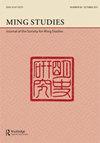Preface to Volume 84
IF 0.3
0 ASIAN STUDIES
引用次数: 0
Abstract
Our first article is Yuanfei Wang’s “What Hangs on a Hairpin: Inalienable Possession and Language Exchange in Two Marriage Romances” which compares Jiang Fang’s (792–835), “Huo Xiaoyu’s Story”, with Tang Xianzu’s (1550–1616) dramatic adaptation, The Purple Hairpins (1595). In particular, Yuanfei Wang focuses on the hairpins and examines how they differ in function, meaning and materiality in these works. Our second article is “Predicament of the Hongwu Emperor and his Defense for the Regime’s Legitimacy” by Yan Xuanjun and Han Xu. Starting from the premise that Zhu Yuanzhang needed to override both loyalty scholars held for the previous Yuan dynasty and a personal disdain because of his humble status, Yan and Han posit that in the first three years the emperor made a concerted effort to establish the legitimacy of his rule through the use of the Mandate of Heaven, an intense courtship of scholars and the offer of positions to these and other scholars in compiling first a history of the Yuan dynasty, and secondly a book on rituals for the Ming dynasty. In this issue, we have included two interviews. The first is Paola Zamperini’s interview of Katherine Carlitz, a scholar whose work on Ming literature, especially the Jinpingmei, and Ming history, and especially the lives of Chinese women during this period, has been very influential in the field. The second interview, conducted by Jo-lan Yi is with Li Lin-yueh, who has made signal contributions to the study of the Ming through its politics, culture, social structure and education. Aaron Molnar contributes a review of John Dardess’ More than the Great Wall: The Northern Frontier and Ming National Security, 1368–1644. We conclude withMing News and an observation. The rise of virtual conferences and particularly virtual events and workshops has brought about some potentially altering changes in the nature of academic contact. It has meant that there is a greater possibility of sharing scholarship (and also teaching) with peers in the near backyard as well as across the globe. No doubt, in-person conferences with their benefits will return, but the advantage of doing a low-key workshop for a couple of conveniently aligned hours has been made clear to any and sundry who participated in any over the past year. Secondly, tracking this intensified networking (for the purpose of keeping abreast of one’s field) illumines the rich and often unheralded breadth of the conversations that are ongoing. The implications are thus rich Ming Studies, 84, 1–2, October 2021第84卷序言
我们的第一篇文章是王的《挂在发卡上的东西:两段婚姻罗曼史中的不可剥夺的占有与语言交流》,它将姜方(792–835)的《霍小渔的故事》与汤显祖(1550–1616)的戏剧改编《紫发卡》(1595)进行了比较。王远飞特别关注这些发夹,并考察它们在功能、意义和物质性方面的差异。本文的第二篇是阎玄钧、韩旭的《洪武的困境及其对政权合法性的辩护》。从朱元璋需要推翻对前一个元朝的忠诚学者和因其地位卑微而受到的个人蔑视这一前提出发,阎和韩认为,在最初的三年里,皇帝通过使用天命来建立其统治的合法性,学者们的强烈追求,以及为这些学者和其他学者提供职位,首先编纂了一部元代史,其次编纂了一本关于明朝仪式的书。在本期中,我们收录了两次访谈。首先是Paola Zamperini对Katherine Carlitz的采访,这位学者对明代文学,尤其是《金瓶梅》和明史,尤其是这一时期中国女性的生活的研究在该领域非常有影响力。第二次访谈由赵兰逸主持,访谈对象是在政治、文化、社会结构、教育等方面对明代研究作出重大贡献的李林越。Aaron Molnar对John Dardess的《不止长城:北方边疆与明朝国家安全》(1368-1644)进行了评论。我们以《明报》和一篇观察文章作为结论。虚拟会议,特别是虚拟活动和研讨会的兴起,给学术接触的性质带来了一些潜在的改变。这意味着与附近后院以及全球各地的同龄人分享奖学金(以及教学)的可能性更大。毫无疑问,带着福利的面对面会议将回归,但在过去一年中,任何参加过会议的人都清楚地知道,在几个方便的时间内低调举办研讨会的好处。其次,追踪这种强化的网络(目的是了解自己的领域)揭示了正在进行的对话的丰富而往往不为人知的广度。因此,《明研究》的启示是丰富的,84,2021年10月1日至2日
本文章由计算机程序翻译,如有差异,请以英文原文为准。
求助全文
约1分钟内获得全文
求助全文

 求助内容:
求助内容: 应助结果提醒方式:
应助结果提醒方式:


